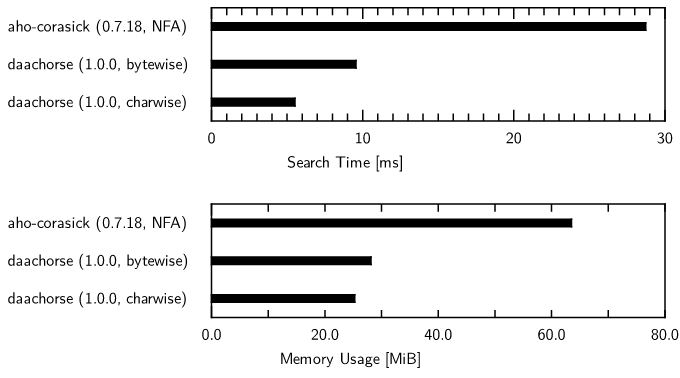11 releases (1 stable)
| 1.0.0 | Aug 1, 2022 |
|---|---|
| 1.0.0-rc.1 | Jul 7, 2022 |
| 0.4.3 | Jun 7, 2022 |
| 0.4.1 | Mar 6, 2022 |
| 0.2.1 | Nov 1, 2021 |
#2 in #double-array
6,814 downloads per month
Used in 48 crates
(16 directly)
170KB
3K
SLoC
🐎 daachorse: Double-Array Aho-Corasick
A fast implementation of the Aho-Corasick algorithm using the compact double-array data structure.
The main technical ideas behind this library appear in this paper.
Overview
Daachorse is a crate for fast multiple pattern matching using the Aho-Corasick algorithm, running in linear time over the length of the input text. This crate uses the compact double-array data structure for implementing the pattern match automaton for time and memory efficiency. The data structure not only supports constant-time state-to-state traversal but also represents each state in the space of only 12 bytes.
For example, compared to the NFA of the aho-corasick crate, which is the most popular Aho-Corasick implementation in Rust, Daachorse can perform pattern matching 3.0–5.2 times faster while consuming 56–60% smaller memory when using a word dictionary of 675K patterns. Other experimental results are available on Wiki.
Requirements
Rust 1.58 or higher is required to build this crate.
Example usage
Daachorse contains some search options, ranging from standard matching with the Aho-Corasick algorithm to trickier matching. They will run very fast based on the double-array data structure and can be easily plugged into your application, as shown below.
Finding overlapped occurrences
To search for all occurrences of registered patterns that allow for positional overlap in the input
text, use find_overlapping_iter(). When you use new() for construction, the library assigns a
unique identifier to each pattern in the input order. The match result has the byte positions of
the occurrence and its identifier.
use daachorse::DoubleArrayAhoCorasick;
let patterns = vec!["bcd", "ab", "a"];
let pma = DoubleArrayAhoCorasick::new(patterns).unwrap();
let mut it = pma.find_overlapping_iter("abcd");
let m = it.next().unwrap();
assert_eq!((0, 1, 2), (m.start(), m.end(), m.value()));
let m = it.next().unwrap();
assert_eq!((0, 2, 1), (m.start(), m.end(), m.value()));
let m = it.next().unwrap();
assert_eq!((1, 4, 0), (m.start(), m.end(), m.value()));
assert_eq!(None, it.next());
Finding non-overlapped occurrences with the standard matching
If you do not want to allow positional overlap, use find_iter() instead.
It performs the search on the Aho-Corasick automaton
and reports patterns first found in each iteration.
use daachorse::DoubleArrayAhoCorasick;
let patterns = vec!["bcd", "ab", "a"];
let pma = DoubleArrayAhoCorasick::new(patterns).unwrap();
let mut it = pma.find_iter("abcd");
let m = it.next().unwrap();
assert_eq!((0, 1, 2), (m.start(), m.end(), m.value()));
let m = it.next().unwrap();
assert_eq!((1, 4, 0), (m.start(), m.end(), m.value()));
assert_eq!(None, it.next());
Finding non-overlapped occurrences with the longest matching
If you want to search for the longest pattern without positional overlap in each iteration, use
leftmost_find_iter() with specifying MatchKind::LeftmostLongest in the construction.
use daachorse::{DoubleArrayAhoCorasickBuilder, MatchKind};
let patterns = vec!["ab", "a", "abcd"];
let pma = DoubleArrayAhoCorasickBuilder::new()
.match_kind(MatchKind::LeftmostLongest)
.build(&patterns)
.unwrap();
let mut it = pma.leftmost_find_iter("abcd");
let m = it.next().unwrap();
assert_eq!((0, 4, 2), (m.start(), m.end(), m.value()));
assert_eq!(None, it.next());
Finding non-overlapped occurrences with the leftmost-first matching
If you want to find the earliest registered pattern among ones starting from the search position,
use leftmost_find_iter() with specifying MatchKind::LeftmostFirst.
This is the so-called leftmost first match, a tricky search option supported in the
aho-corasick crate. For example, in the following
code, ab is reported because it is the earliest registered one.
use daachorse::{DoubleArrayAhoCorasickBuilder, MatchKind};
let patterns = vec!["ab", "a", "abcd"];
let pma = DoubleArrayAhoCorasickBuilder::new()
.match_kind(MatchKind::LeftmostFirst)
.build(&patterns)
.unwrap();
let mut it = pma.leftmost_find_iter("abcd");
let m = it.next().unwrap();
assert_eq!((0, 2, 0), (m.start(), m.end(), m.value()));
assert_eq!(None, it.next());
Associating arbitrary values with patterns
To build the automaton from pairs of a pattern and user-defined value, instead of assigning identifiers
automatically, use with_values().
use daachorse::DoubleArrayAhoCorasick;
let patvals = vec![("bcd", 0), ("ab", 10), ("a", 20)];
let pma = DoubleArrayAhoCorasick::with_values(patvals).unwrap();
let mut it = pma.find_overlapping_iter("abcd");
let m = it.next().unwrap();
assert_eq!((0, 1, 20), (m.start(), m.end(), m.value()));
let m = it.next().unwrap();
assert_eq!((0, 2, 10), (m.start(), m.end(), m.value()));
let m = it.next().unwrap();
assert_eq!((1, 4, 0), (m.start(), m.end(), m.value()));
assert_eq!(None, it.next());
Building faster automata on multibyte characters
To build a faster automaton on multibyte characters, use CharwiseDoubleArrayAhoCorasick instead.
The standard version DoubleArrayAhoCorasick handles strings as UTF-8 sequences and defines
transition labels using byte values. On the other hand, CharwiseDoubleArrayAhoCorasick uses
Unicode code point values, reducing the number of transitions and faster matching.
use daachorse::CharwiseDoubleArrayAhoCorasick;
let patterns = vec!["全世界", "世界", "に"];
let pma = CharwiseDoubleArrayAhoCorasick::new(patterns).unwrap();
let mut it = pma.find_iter("全世界中に");
let m = it.next().unwrap();
assert_eq!((0, 9, 0), (m.start(), m.end(), m.value()));
let m = it.next().unwrap();
assert_eq!((12, 15, 2), (m.start(), m.end(), m.value()));
assert_eq!(None, it.next());
no_std
Daachorse has no dependency on std (but requires a global allocator with the alloc crate).
CLI
This repository contains a command-line interface named daacfind for searching patterns in text
files.
% cat ./pat.txt
fn
const fn
pub fn
unsafe fn
% find . -name "*.rs" | xargs cargo run --release -p daacfind -- --color=auto -nf ./pat.txt
...
...
./src/errors.rs:67: fn fmt(&self, f: &mut fmt::Formatter) -> fmt::Result {
./src/errors.rs:81: fn fmt(&self, f: &mut fmt::Formatter) -> fmt::Result {
./src/lib.rs:115: fn default() -> Self {
./src/lib.rs:126: pub fn base(&self) -> Option<u32> {
./src/lib.rs:131: pub const fn check(&self) -> u8 {
./src/lib.rs:136: pub const fn fail(&self) -> u32 {
...
...
License
Licensed under either of
- Apache License, Version 2.0 (LICENSE-APACHE or http://www.apache.org/licenses/LICENSE-2.0)
- MIT license (LICENSE-MIT or http://opensource.org/licenses/MIT)
at your option.
For software under bench/data, follow the license terms of each software.
Contribution
Unless you explicitly state otherwise, any contribution intentionally submitted for inclusion in work by you, as defined in the Apache-2.0 license, shall be dual licensed as above, without any additional terms or conditions.
